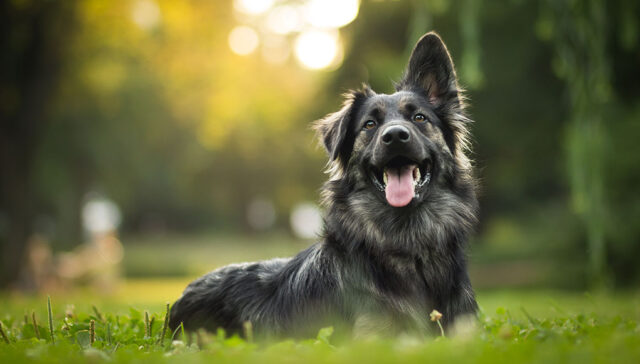
Table of Contents
- How to Prepare your Pet for Spring?
- Spring Safety Tips For Dogs
- Gradual Stimulation
- Obedience Training
- Practice Good Manners
- Springtime Allergies
- Parasite Concern
- Vaccination for Common Diseases During Spring
- Hydrate Regularly
- Keep Chemicals and Tools Out of their Reach
- Watch out for Toxic Flowers
- Holiday Sweets are a No-no!
- Buckle to Avoid Trouble!
- Check Their Harness
- Avoid Insects
- Be Cautious of Wild Animals
- Keep Calm During Storms
- Frequently Asked Questions
- Spring Safety Tips for Dogs: Summary
It’s springtime, and it’s time for your fur buddy to welcome the new season and the outdoors!
It’s the season of blooms and warmer weather too! Spring is a wonderful time of year, full of sunshine, blooming flowers, and warmer temperatures.
It's also when we are eager to spend more time outdoors with our furry friends.
However, spring also brings safety concerns for dogs. Luckily for you, we've got you the best spring safety tips for dogs.
As pet owners, we must ensure our pets are safe and healthy. And we can do this by being informed and cautious about our environment.
From allergies to potential environmental hazards, many things can harm Fido during this season. Here are some spring safety tips to keep your canine companion happy and healthy.
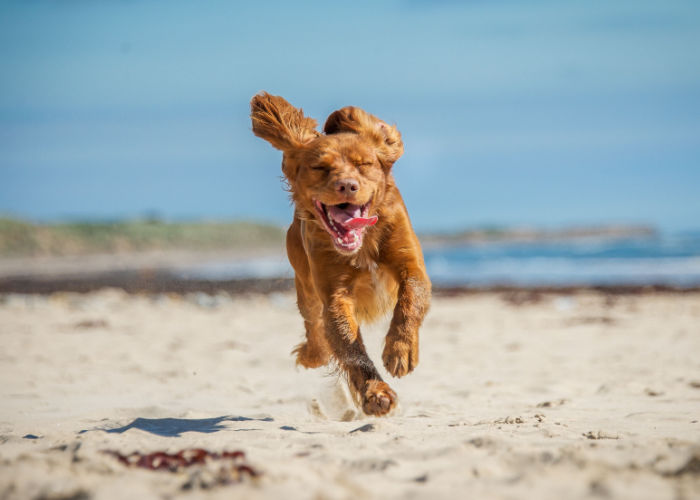
How to Prepare your Pet for Spring?
Dogs may be overwhelmed after a long time of staying indoors and finally being able to come out.
A way to prepare your dog is to prepare yourself as an owner.
As the season changes, frost has melted, warm breezes flow, and rain showers are here, environmental changes can also impact your dog.
Making your surrounding dog spring ready is the best way to go. Owners may start by creating a schedule for their dog’s consultation, vaccination, and deworming with the veterinarian.
Of course, owners may include the first visit outside of the home in the schedule in preparation for spring.
Owners can also organize their homes and keep household items, tools, and other materials that can harm their pets out of sight and reach.
Pet owners can also purchase any necessary accessories their pets may need as they are about to head outdoors.
Spring Safety Tips For Dogs
Is your dog spring-ready? Here are some tips to keep your dogs safe this spring!
Gradual Stimulation
The winter season was filled with stay-at-home pursuits and fewer maneuvers for your fur buddy, so their muscles and joints have not worked out as they should.
Now that spring has arrived, your dog can spend so much time and activities outdoors!
Not all dogs are flexible when it comes to changing atmospheres and seasons. Some dogs may need more time to welcome the new season.
The first advice we can give as spring safety tips for dogs is to be patient and gradually help Fido adjust to the new season.
Owners may start with small and short visits outside rather than going all out on their first day out.
After a few short walks outside the house to the yard, owners can gradually take them out on a walk further away from home.
It’s essential to be keen on your dog’s condition. Take breaks and return home immediately if your dog display discomfort.
If your dog catches up on the short walks, it can eventually return to its normal exercise routine. This can help avoid injuries as well.
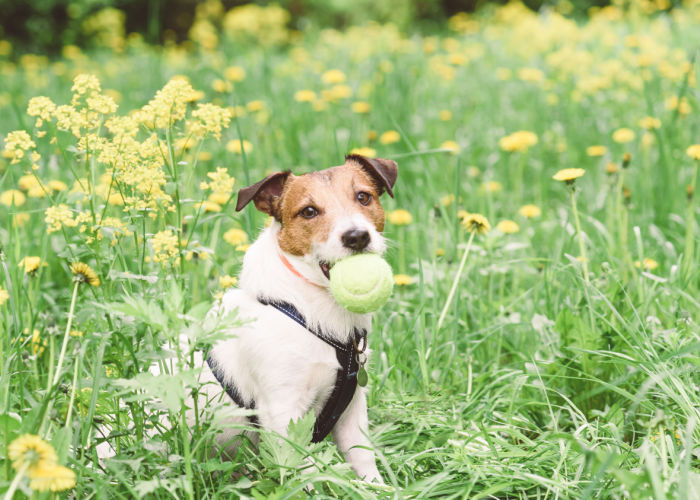
Obedience Training
Of course, your dog shouldn’t miss out on running their heart out on the field or outdoors.
It’s best to keep them on a harness, but if your dog is trained to return on command, wouldn’t it be a better experience for the both of you to enjoy the outdoors with less toil?
Practice Good Manners
Along with your best buddy, other dogs are also trying to welcome the spring season.
Make sure to respect the space of these dogs, as not all dogs are as welcoming and friendly after a long time staying at home.
Be vigilant, give space, avoid bringing toys, and be attentive with your dog.
If you notice your dog is displaying discomfort and insecurity from another dog’s presence, walk further away until they feel safer.
On the other hand, if your dog is displaying unfriendly behavior and threatening other dog’s stay in the park, remove them from the situation and calm them down.
If they behave better, you can return back to the outdoors, but if they display the same behavior, it’s best to train them first.
Let’s make spring a pleasant experience for everyone’s dogs.
Springtime Allergies
It’s the season of flowers blooming, pollen piling up, and dust accumulating. Guess what? Allergies are not going to miss out!
Prepare your pet for their medication if they are diagnosed with allergies.
If your dog is showing allergy symptoms (sneezing, constant licking and biting, rashes, flaky skin, and runny eyes), visit your veterinarian immediately.
Ask your veterinarian what your pet should avoid for now and if there are other activities they may do instead.
Although your pet’s spring experience will be compromised, their safety and health won’t be.
There are many ways to make your dog’s experience pleasant and entertaining while they keep watch for allergy attacks.
Parasite Concern
Spring brings rain showers from time to time. This will mean that the environment will be much more humid, and this kind of environment is the best time for fleas and ticks to inhabit.
The spring season is also when tick, flea, and Lyme diseases are more common.
Ensure your dog is checked regularly and has their deworming and other medication is taken to prevent these diseases.
Vaccination for Common Diseases During Spring
Spring brings the animals out of hibernation. Unfortunately, they also bring out some diseases back into the track again.
Be prepared by taking your fur buddy to the veterinarian to have their vaccination for diseases in spring. Make sure they can complete the shot.
Leptospirosis is one of the most common diseases in spring, and another is infections.
Make sure to inquire with your veterinarian for prevention, treatment, and instructions to prevent these diseases. It’s best to avoid puddles of water outdoors as well.
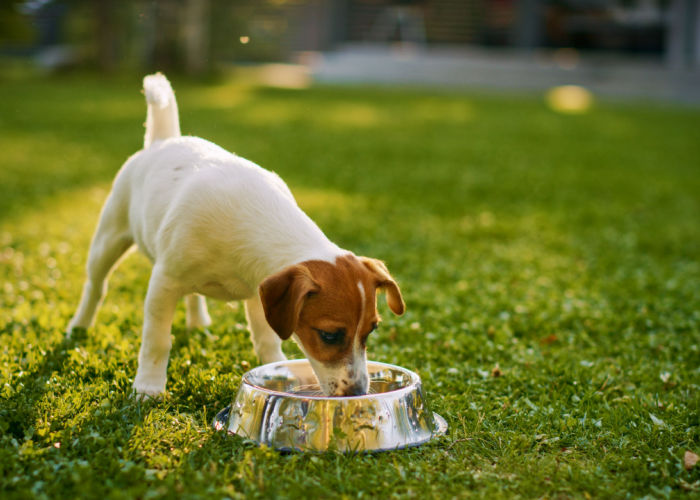
Hydrate Regularly
As the season gets warmer, our best buddies can also feel their body is warming up. Don’t forget to keep your fur buddies hydrated, especially during outdoor activities.
Avoid being in the sun for too long, which can cause stroke and dehydration. Make sure to bring a generous amount of water for your dog. Stay cool and hydrated!
Keep Chemicals and Tools Out of their Reach
It’s the season when you can finally revamp or polish your home.
You may start with spring general cleaning or make-over but ensure that your pet has no access to any chemical used to clean your house.
Products include bleach, carpet fresheners, carpet shampoo, essential oils, fabric softeners, newly used fertilizers (for at least 24-48 hours), grout, petroleum jelly, toilet cleansing caplets, and vinegar are toxic household products for pets.
Owners should also be keen on the tools and items they use during their home revamp polishing.
Regardless of the list, keep household chemicals and tools out of your dog's reach. This can help avoid accidents and unpleasant experiences in the future!
Watch out for Toxic Flowers
Spring is without bloom. Some flowers are just too captivating not to have, but sadly not all flowers are safe for our pets.
Some flowers that bloom in spring, like Daffodils, Foxtails, Hyacinths, Lilies, or Wisteria, are quite toxic for our fur buddies.
Do watch for these flowers, and research if any flowers are harmful to your dogs that are available in your state.
Avoid bringing these flowers into your home, and be attentive during activities outside your dog. Whatever your dog is sniffing and trying to swallow is your responsibility and business!
Holiday Sweets are a No-no!
The spring season consists of holidays and celebrations. No doubt, events like Easter may not be the safest for your fur buddy.
Remember to thoroughly check your home or your yard for any sweets they may happen to ingest.
Although sugar is not toxic to dogs, consuming and overeating sugary foods harms their health.
One of the most poisonous foods for dogs is avocado, caffeine, chocolate, some dairy products, fruit seeds, grapes, macadamia nuts, raisins, and xylitol. These ingredients are most likely found in events celebrated at easter.
Remove and dispose of these properly where your dog cannot access them.
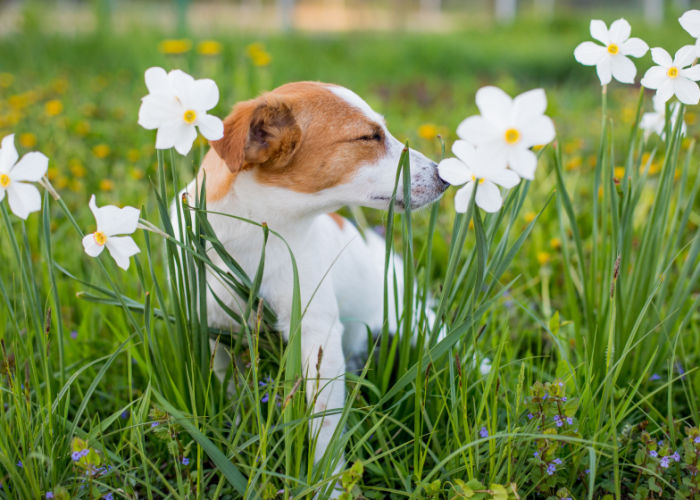
Buckle to Avoid Trouble!
If you're taking out your fur buddy for a trip, you may want to buckle them up for safety!
This is especially applicable for those dogs that are not used to car rides or have not been taking car rides during the colder seasons.
This can provide comfort and safety for you and them!
You may use a car dog car seat, car dog crate, or a companion to stay with your dog in its seat.
We’re trying to avoid abrupt distractions, sudden accidents, and for them to run off. This is best done gradually.
If your dog is not used to these enclosures, you may train them by making the section a safe and pleasant space. Until they’re used to it, you may use it then.
Check Their Harness
Here you are, out and about in the outdoors with your best buddy, then suddenly, their harness wasn’t properly attached.
Then you come running, chasing them off to the sunset. We don’t want that, don’t we?
Remember to check the harness you have on your pet before and during your time outdoors. The harness may easily snap off if they are not secured properly.
Unless your dog is trained to come back on command, you may want to triple-check the saddle before all that trouble happens.
Avoid Insects
Bees and ants are out in the open after the cold season dissipates. Plus, your dog is just too curious to leave it alone.
And, of course, these small insects must defend themselves from your giant hairy buddy.
If your buddy has been stung by a bee, call and follow the instruction of the veterinarian immediately.
The veterinarian may instruct you on ways to alleviate the reaction. They will likely ask to take your dog to the clinic if symptoms persist.
Fire-ants and other ants may do the same. After being examined by the giant hair dog, they will likely bite them, which is painful.
If your dog shows symptoms, bring them to the veterinarian immediately.
Be Cautious of Wild Animals
Be attentive to your pet, especially when you’re outdoors. Spring means hibernation is over for some animals, so it may be time to collect resources before summer.
If you decide to hike in the woods, be mindful of wild animals such as bears, deer, and other animals that may be around.
This may also happen in our home, so keep your windows closed if it does not have a screen.
When it comes to the beach, some sea creatures wind up at the shore.
Remember to keep a safe distance, do not interact, and do not feed any animals as it may set off other animals to gather.
Keep Calm During Storms
Some dogs are terrified of lightning and storms. Owners may use prescribed supplements provided by the veterinarian.
Owners may also use CBD oil to alleviate anxiety and stress.
You and Fido can enjoy this wonderful season with these spring safety tips for dogs.
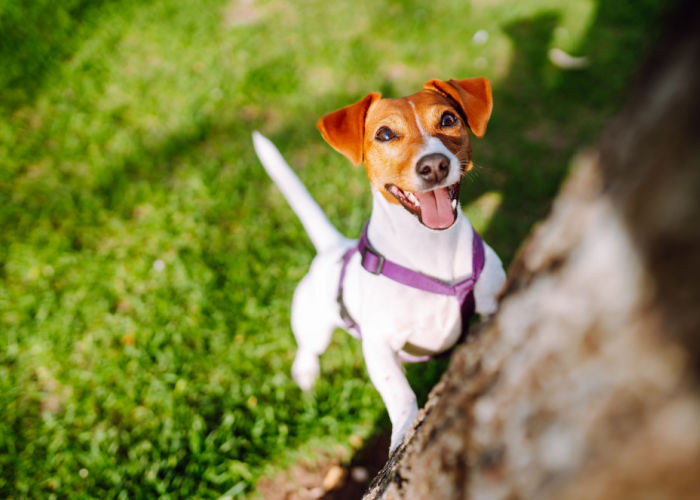
Frequently Asked Questions
What are spring hazards for dogs?
Some common springtime hazards for dogs are poisonous plants, pesticides, open bodies of water, and high temperatures that can lead to dehydration or heatstroke.
How do I prepare my dog for spring?
As pet owners, you can keep your dog safe from poisonous plants by familiarizing yourself with which plants are toxic to dogs and ensuring they are not present in your yard or on your walks.
Moreover, prepare water to avoid dehydration if you plan a day out.
You can always check this blog to review spring safety tips for your dogs or whenever you're in doubt.
How to prevent my dog from getting dehydrated or suffering from heatstroke?
You can prevent your dog from getting dehydrated or suffering from heatstroke by ensuring they have access to plenty of fresh water and shade.
Exercising your dog during the hottest day is a big no-no. Always look for signs of heatstroke, such as panting, vomiting, and lethargy.
Spring Safety Tips for Dogs: Summary
Spring can be a fun and exciting time for dogs and their owners.
Taking simple safety precautions can help ensure your furry friend stays healthy and happy all season.
These spring safety tips for dogs can be your checklist to protect your dog this season.
Remember to watch out for allergies, toxic plants, and water hazards, keep your dog's vaccinations up-to-date, protect against parasites, and provide plenty of shade and water.
With these tips in mind, you and your dog can enjoy all the wonders of spring together.












